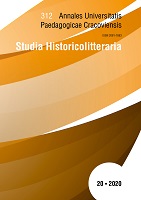Literatura hiszpańskojęzyczna o władztwie religii katolickiejnad ciałem osób duchownych i konsekrowanych
Spanish-language literature on the power of Catholic religion over the bodies of clergymen and consecrated people
Author(s): Olga GrzyśSubject(s): Social Theory, Sociology of Culture, Biblical studies, Sociology of Religion
Published by: Wydawnictwo Uniwersytetu Komisji Edukacji Narodowej w Krakowie
Keywords: Spanish language literature; Catholic Church; Catholic religion; body; clergymen and consecrated people;
Summary/Abstract: Catholic religion presents an ambivalent attitude towards the body: it adores the tormented and resurrected body of Christ, but rejects human physicality, regarding it as a cause and consequence of sin. Such conviction led to imposing numerous restrictions on almost all life spheres of priests, nuns and monks. They cannot get around, get dressed or decide about their activities and relationships freely. They subject their bodies to mortification, vowing celibacy and sexual abstinence. However, a desire to marginalise the physical sphere of human life, which was rooted in the Church, has produced the opposite result. As a consequence, the body became the centre of interest not only for clergymen and believers, but also writers, poets and artists from different countries and periods. The paper focuses on the literature of Spanish-speaking countries, searching for references to the methods of bodily discipline among clergymen and consecrated people. The abundance and variety of presented examples point to the fact that this topic is worth of interest and a deeper analysis.
Journal: Annales Universitatis Paedagogicae Cracoviensis. Studia Historicolitteraria
- Issue Year: 2020
- Issue No: 20
- Page Range: 369-385
- Page Count: 17
- Language: Polish

